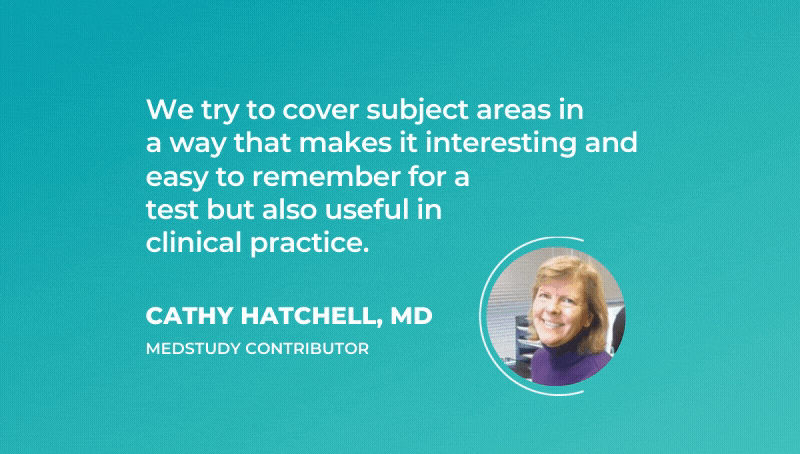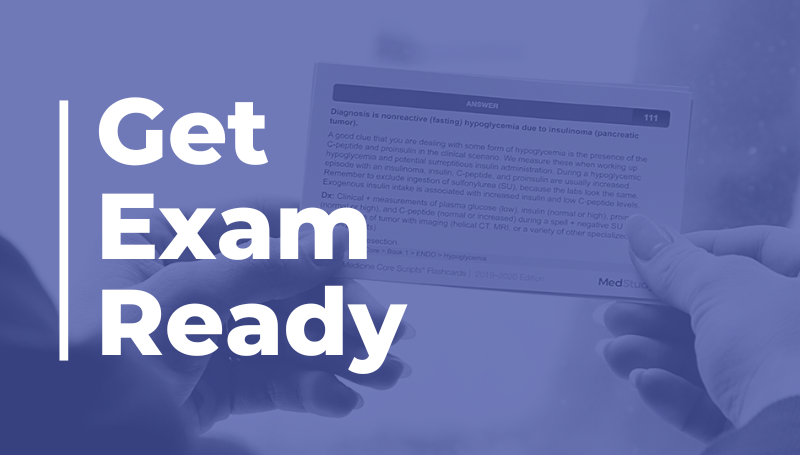Meet the Medical Educators Behind MedStudy—Cathy Hatchell, MD

At MedStudy, our goal is to develop quality study materials for medical education. We’re privileged to work with an amazing team of knowledgeable, skilled, and insightful internal medicine physicians and pediatricians. Cathy Hatchell, MD—the senior editor on our new 18th Edition Internal Medicine Core—is a prime example. In part one of this two-part feature, we talk with Cathy about her role as senior editor and her contribution to our 18th Edition Internal Medicine resources.
MS: Thanks so much for taking the time to chat with us! Let’s talk about your role at MedStudy. What exactly does a senior editor do?
CH: Senior editor means not editing so much as overseeing the content in general. For example, with the new Core I made sure that within the sections there are answers to our Preview | Review questions. I do a little bit of editing for active language. And I supervise the iThenticate® process—making sure there is no plagiarism. What’s exciting for me this year is working with the writers of the new content areas—psychiatry, geriatric medicine, and women’s and men’s health—and helping them get into the MedStudy style and cover the material we think is important.
MS: Tell us about that new content.
CH: We’ve added a much more robust psychiatry and mental health section. We also expanded women’s and men’s health—urology and gynecology. And we’ve expanded geriatric medicine. The writers of this content are new to the MedStudy family. They’re specialists, so part of my job is to make sure their content is geared to internal medicine primary care—not too detailed for what we might need to know in the office. We want to give physicians the information they need but not so much that they’re bogged down by details.
MS: You mentioned “active language.” What is that?
CH: Active language makes information more interesting for the reader by using a directive instead of a passive voice. For example, instead of saying, “The rheumatoid factor checks for rheumatoid arthritis are...” we say, “When diagnosing rheumatoid arthritis, check the....” It makes it more engaging for the reader, more direct.
MS: And how would you describe the MedStudy style?
CH: I would say the MedStudy style is, again, an active voice that engages the reader and points them in the right direction. We try to cover subject areas in a way that makes it interesting and easy to remember for a test but also useful in clinical practice.
MS: Besides the new content, what was your focus for the 18th Edition Core?
CH: What we’ve tried to do is really fine-tune our alignment with the ABIM blueprint. So, to sharpen the content in the 18th Core, I looked through the entire 17th Core and tried to identify any areas where we didn’t have enough material to match the blueprint, to help prepare people for the test.
In the 17th Edition, we introduced hospitalist content. For the 18th Core, we spent more time reviewing our internal medicine material to see what might be applicable for hospitalists. They have their own board testing, and it’s an up-and-coming specialty. Some of the material is useful for them, and some is not, so we decided to highlight what might be important for hospitalists in case they wanted to just focus on those sections.
MS: You’ve worked on both the 17th and 18th Editions. How would you compare them?
CH: I think they’re more similar than they are different. The big thing we did for the 18th was really look at the ABIM blueprint recommendations for each topic area. We also had a set of additional specialist reviewers who thoroughly went through the 17th and suggested what to include and what not to. They provided a thorough overview, so that was a big project. Dr. Mark Yoffe [senior medical reviewer] is one of the editors who reviewed most sections and had a lot of ideas. And then, of course, the section editors and I are always looking to make sure that guidelines we include are the most current and up to date [and checking] if things have changed, which sometimes they do. For example, the latest recommendation is that people get screened for Hepatitis C. The test has been around for a while, but before this they’ve never recommended general screening. And so those kinds of recommendations need to be within the Core. Or vaccine updates: I wrote the section material for the Zika virus, which is new. We need to make sure we’re keeping current.
MS: You mentioned section editors. What do they do and what is your process of working with them?
CH: I oversee the section editors, who are content-specific specialists doing the writing and the editing. I look at what they do, and I settle the matter if one person thinks one thing and one thinks another. I try and figure out which way we want to go. Usually by the time material gets to me there are specific questions from the copy editors who have reviewed the section editors’ work. There are two section editors—they follow each other, and then I follow them.
MS: Did you work on any other 18th Edition products?
CH: I’m always working with Q&As and I’ve done some editing [on them]. I look at new questions to make sure that they’re appropriate, where there are gaps, and if we need more questions regarding certain subjects. I also review errata for internal medicine and edit Core Scripts® Flashcards, making sure they’re accurate and make sense. For the 18th Edition we have new cards with new content.
Last year, I reviewed Audio Pearls, which I love. They are a summary of the most important points within the Core with interpretations by some great teachers. And the 18th Edition Core Audio Pearls will be a wonderful way to digest the Core material by listening. Both [Audio Pearls] editions are great supplements and can be used on the go. I really like working on these products.
We’re not done talking with Dr. Hatchell just yet. Read the rest of our interview with her, including her tips on using the new 18th Edition Core!


